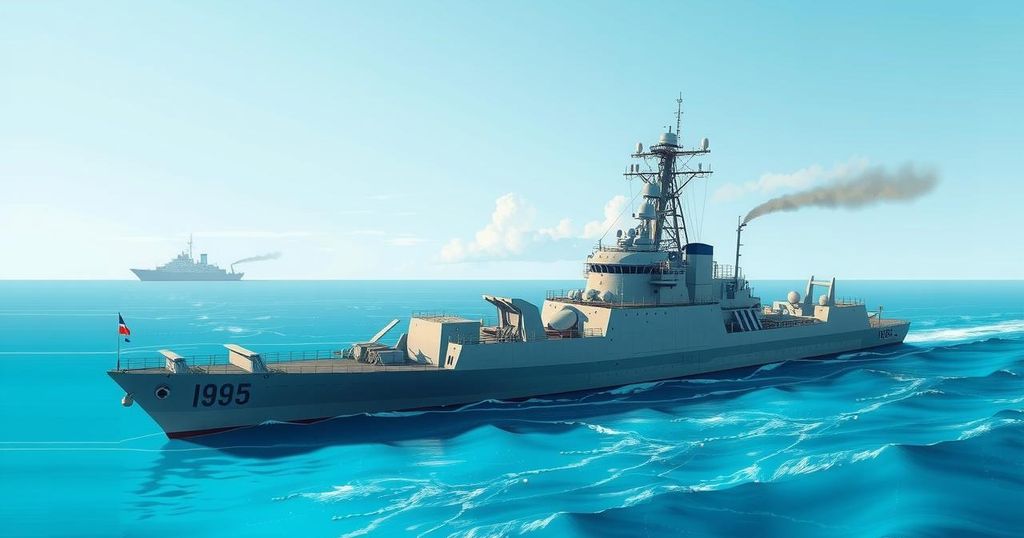Global news
ASIA, BASHA, BASHAR AL - ASSAD, BO, DEFENCE, EUROPE, INTERNATIONAL RELATIONS, JOEL ROBERTS, LONDON, MARITIME SECURITY, MILITARY, NATO, NORTH AMERICA, PORTSMOUTH, ROYAL NAVY, RUSSIAN INVASION OF UKRAINE, SOMERSET, SYRIA, TARTUS, THE TIMES, UNITED KINGDOM, UNITED STATES
Fatima Khan
0 Comments
UK Royal Navy Monitors Russian Cargo Ship and Corvette Returning from Syria
The UK Royal Navy tracked the movements of the Russian warship Boikiy and the cargo ship Baltic Leader, suspected of carrying armaments from Syria, in a recent operation dubbed “the Syrian Express.” This mission, conducted between March 1 and March 3, involved coordination with NATO forces and was prompted by the ongoing risks from Russian military logistics. The Baltic Leader has a history of sanction violations and continues to be monitored by various authorities.
The Royal Navy of the United Kingdom recently completed a three-day operation to track a Russian warship and a military cargo ship suspected of transporting armaments from Syria. This operation marks another instance of a series of such missions, dubbed “the Syrian Express” due to their frequency, as reported by The Times of London.
The Royal Navy reported that the Russian corvette, named Boikiy, was initially detected heading south from the Baltic Sea. The Type 23 frigate HMS Somerset, stationed in Portsmouth, was dispatched to follow the movements of the warship. Commander Joel Roberts, in charge of Somerset, remarked that the ship “is well versed in the escort of Russian ships, having conducted these operations on a number of occasions.”
This specific operation involved coordination with UK patrol aircraft and NATO forces, in addition to the deployment of Somerset’s Merlin helicopter for reconnaissance. The Belgian minehunter, BNS Crocus, also participated in the tracking efforts, enhancing the operation’s capacity.
During the operation, Boikiy met with the cargo vessel Baltic Leader, which was believed to be departing from the Tartus naval base in Syria. Reports suggest the Baltic Leader has been instrumental in the removal of military assets amid the Russian evacuation following the downfall of Syrian dictator Bashar al-Assad. The Times indicated that satellite imagery documented military gear on the Tartus dock when Baltic Leader arrived on February 1.
Pictures obtained by The Times exhibited the transit of both the corvette and cargo ship, revealing personnel in military uniforms aboard Baltic Leader, some of whom reportedly operated machine guns at various points throughout the journey. The operation ran from March 1 to March 3, with the two vessels proceeding toward the North Sea and Baltic Sea.
The Baltic Leader, a Roll-on/Roll-off cargo ship with a deadweight tonnage of 7,100, has gained notoriety for transporting Russian equipment. In 2022, it was temporarily detained by French authorities for alleged sanction violations, leading to legal proceedings against the ship’s captain, who was later acquitted in October 2024. Earlier this year, Portuguese authorities also tracked Baltic Leader on another voyage associated with the “Syrian Express.”
This mission represented HMS Somerset’s second activation this year for tracking Russian naval activity. Previously, in January, Somerset, alongside the patrol vessel HMS Tyne, monitored the alleged Russian spy ship Yantar. Just two weeks prior, HMS Iron Duke, HMS Tyne, and RFA Tideforce were involved in surveilling multiple Russian vessels, including three cargo ships believed to be returning from Syria to a Russian Baltic port.
The UK Royal Navy’s operation to track the Russian corvette Boikiy and the cargo ship Baltic Leader underscores the ongoing concerns surrounding military logistics from Syria. This mission, part of the frequent monitoring of Russian naval activities, involved collaboration with various naval and aerial forces, marking yet another chapter in the intricate dynamics of military operations in the region. The situation highlights both the complexities of maritime security and the significance of international vigilance in monitoring potential threats.
Original Source: maritime-executive.com




Post Comment